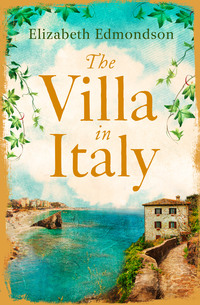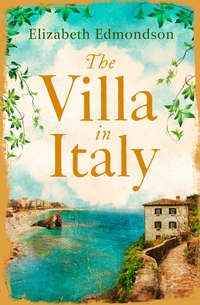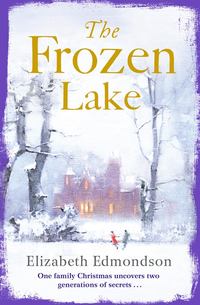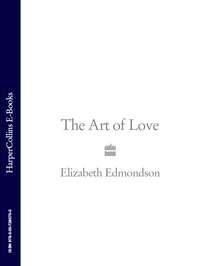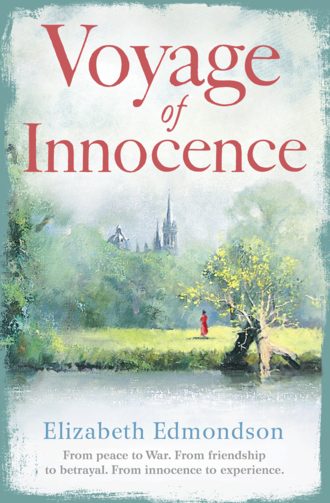
Полная версия
Voyage of Innocence
She slept for a while, then woke feeling more seasick than ever. She could feel her hair damp and clammy at the side of her face; would this dreadful rolling and plunging never stop?
It was worse with her eyes open, and she closed them again. The stewardess came in, and persuaded her to sip more ginger cordial. Lally hated the taste of ginger, but Pigeon was right, it did soothe her stomach, if only a little.
Why were those early days at Grace so much on her mind?
She was back in the quad, the biggest open space inside the college. There was a single tree, in the centre, a plane tree, and the square grassed area, in which the tree was set, was intersected by diagonal tarmac paths.
Claudia was there, on her bicycle. Or, more accurately, off her bicycle. She’d decided to buy a bicycle and learn to ride it that very afternoon.
‘It’ll take more time than that,’ Miss Harbottle said, in her most authoritative voice. ‘Your sort always thinks you can do anything at once.’
‘My sort usually can,’ said Claudia, picking herself up and launching herself off again.
‘And the quad isn’t the place to learn,’ Harbottle shouted after her. ‘Bicycles aren’t allowed, as you very well know.’
‘It’s the perfect place to learn,’ Vee said. ‘Only think of the chaos she’d cause if she went on a road.’
Alfred Gore appeared through the arch at the south side of the quad, tall and lanky and amused. You could tell, even then, that he had eyes for no one but Vee, until a loud yell from Claudia, who had ridden with wild abandon into the tree, distracted him. He sauntered over and hauled her to her feet, then righted the cycle.
‘Good thing you hadn’t got up any speed,’ he said. ‘I’ll hold on to the back of the saddle, and you concentrate on getting your balance. OK?’
Claudia nodded, and they were off, Alfred running beside her, holding the bicycle steady.
Claudia was right, her sort usually could. Instinct, balance and confidence were what made her so different from Miss Harbottle. And Vee, watching and laughing? Observant, self-controlled, quite different from her cousin.
Lally half opened her eyes. Were they so different, after all? Hadn’t they both thrown themselves, heart and soul, into causes? In both cases, with disastrous results, and with who knew what repercussions to come?
Vee was blessed with a clear mind, but hadn’t used it. Claudia had the gift of intuition, but was blind about herself.
Moderation in all things, Lally said aloud.
‘You’re fretting,’ said Miss Tyrell. ‘I have a sleeping draught for you. You will feel better for a sleep.’
‘I’ve been dreaming. Of the past,’ Lally said, not wanting to swallow what Miss Tyrell was holding to her mouth.
‘This will put a stop to that,’ Miss Tyrell said, with unassailable nursery authority.
Lally doubted if the draught would stay down long enough to do any good, but she was too weak to resist.
‘I remember the last Commem,’ she said in a thread of a voice. ‘At Christ Church. The grandest of all the balls that summer. I didn’t know what a Commem Ball was when I started at Oxford. It has a language all its own. They have May Balls in Cambridge and Commemoration Balls at Oxford. Only they don’t hold them in May, I always thought that was kind of strange.’
She stopped talking, holding her breath so that her stomach would settle. Keep talking, don’t think about the boat or the queasiness. ‘That was where I met my husband. At a ball. No, at a dinner party before the ball. At the Oronsays. Do you know the Oronsays, Miss Tyrell? They have a big house in Oxford, set in spectacular grounds. It was June, you know, and the French windows were open, and the scents and sounds of summer came drifting in above the smoke and the talk. The smell of newly mown grass and jasmine, and bees, buzzing in a tub of snapdragons just outside the windows. And a woodpecker, tap, tap, tap. Midsummer, with a huge full moon. Magic in the air, and music, and love. Just like a movie.
‘They were all there, all my Oxford friends. I was going back to America, as soon as term was over. My passage was already booked. On the Normandie. So I wanted a chance to say goodbye to the friends I’d made while I was at Oxford.
‘I didn’t tell Vee or Claudia, but just set about persuading the ones who had gone down to come back for the ball. Alfred, have you come across the Gores?’
‘That’ll be Almeric Gore’s younger son. He was at Eton with one of Claudia’s brothers, always stirring up trouble, a hothead, but no harm in him. He writes for the papers, now.’
‘Yes, so there was Alfred, and Giles and Hugh, Verity’s brother, who’d gone down the previous year. He was the tricky one to get hold of, given that he was wandering about Europe, but friends at the American Embassy tracked him down for me and delivered the invitation. People who were still at Oxford, like Joel and Marcus, weren’t a problem. And I asked Sarah Blumenthal, from Grace, for although she and Claudia didn’t get along too well, I liked her, and we’d played a lot of music together.’
Another silence. ‘I wonder where Sarah is now. We’ve rather lost touch, she married and went to Germany. I don’t think Germany is a good place for her.’
‘Not with a name like that, not these days, not with the way those Nazis are carrying on,’ Miss Tyrell said. She pronounced it ‘Nasties.’
‘Sarah married, I don’t remember her married name. Then Ruth Oronsay got wind of my plans, and invited my party to dinner before the ball at their Oxford house. Sir Iain had been at the House, you see. That’s another one of those Oxford things you have to learn, like Brasenose being BNC, and Teddy Hall, not St Edmund Hall. Aedes Christi, Christ’s House, that’s why they call Christ Church college the House. Sir Iain had made up a party of his own contemporaries, so Ruth said, Let’s all dine and go to the ball together.’
The memories flashed before Lally’s eyes, like stills from a film.
Vee’s face full of delight when she saw Alfred was there. What was it with the two of them? Everyone else could see they were crazy about each other, but seemingly they couldn’t.
Alfred in tails, looking completely at ease in the Oronsays’ magnificent drawing room, Vee teasing him about it: ‘Where did you get those, do you own a set, now you’ve joined the world of the grownups? They’re hardly the ones you borrowed from your tutor, he wouldn’t be so unwise as to lend them again, surely.’
Alfred looking down at himself without enthusiasm: ‘They belong to my elder brother. I always forget how damned uncomfortable this kit is, I feel as though I’m being throttled.’
Vee smiling at him: ‘You look very good in them. You and your brother must be much of a size.’
Claudia, drifting past in a haze of blue, champagne glass in her hand: ‘Does he know you’ve borrowed them?’
Alfred, laughing, asking if that was guesswork or the famous Vere insight. ‘As it happens, I thought it easier not to ask.’
‘What if he has a dance tonight?’
‘I dare say he has a spare set. Or he can take a leaf out of my book, and go in flannels.’
Marcus, in an outrageous gold-threaded waistcoat, sliding through the guests, giving Alfred a kiss: ‘Lovely to see you.’
‘Don’t kiss me, Marcus, it’s bad for my reputation as a hard-hitting journalist. The reason for the tails, Vee, is that Ruth issued an ultimatum re dressing, and I rather wanted to come. I need a little frivolity in my hectic and serious life.’
A heavy sweetness and brilliance from the roses massed in silver bowls around the room. More colour from the women’s long dresses, set off by the austerity of the men’s evening clothes. Sir Iain and a nephew flamboyant in their tartan kilts. An army officer in black and red.
Marcus noticing the officer: ‘Who’s the handsome soldier?’
Henry Messenger, darling Harry, dashing and full of life. Joel, watching him watching me, his face stricken, then glowering.
John Petrus, appearing suddenly, like the demon in the pantomime. Complimenting Claudia and Vee on their looks. A blue glance from Claudia at him, then her eyes fixed on her shoes; how did Petrus so often manage to wipe out Claudia’s gaiety and sense of humour, just by being there?
Vee seeing Hugh across the room, her face lighting up: ‘Hugh! Oh, Hugh, I’d no idea you were coming! I didn’t know you were back in England.’
Hugh, almost gaunt, looking rather tense, accepting a glass of champagne from a hovering footman: ‘Couldn’t miss this, not after a three-line whip from Lally. I only got back this morning, and I’ve been a bit rushed.’
‘You’re looking frightfully thin.’
‘Got a tummy bug that laid me low for a while. Thought my number was up, actually, but a local witch woman looked after me and fed me on foul messes and herby brews; I had to get better, simply to get away from her. Ah, Alfred, good to see you.’
The dinner table, gleaming and glittering with silver and crystal and white and gold porcelain. Shimmering reflections of faces and jewels in the silver epergnes filled with more flowers.
Wonderful food, the buzz of conversation, a sense of pleasure almost tangible.
Ruth Oronsay, addressing her younger guests with sudden seriousness: ‘Youth is a precious time, which vanishes quickly and absolutely. And for your generation, going out into a difficult world, it is doubly precious. You may be called upon to bear terrible responsibilities, just as your fathers were, and then you will look back to this evening and remember the joy of dancing a June night away. Memories of music and light and laughter stay with us all the days of our life; they are the gift that youth bestows upon maturity.’
Prescient, Lally said to herself now. A touch of the Claudias.
Sir Iain on his feet, glass in hand, footmen stepping forward to fill glasses, the guests pushing back their chairs and rising to their feet, the younger people light-hearted and amused by the touch of solemnity.
Sir Iain lifting his glass for the King. Adding another toast, with a smile for his wife. ‘Youth.’
Ruth Oronsay collecting up the ladies and leading the way to the drawing room. No one lingering over coffee and exquisite hand-made chocolates. Guests streaming out of the house and into the waiting motors, the women sweeping their long skirts out of the way of the men’s gleaming patent shoes. The cars setting off through the wrought iron gates on the way to the ball.
Lally dozed, then accepted some more ginger cordial, it did seem to be working, then slept, and woke feeling almost human.
Miss Tyrell was in the cabin, folding clothes.
‘I hope I didn’t wake you, Mrs Messenger. You’re a better colour, that’s a good sign.’
‘I’m feeling better.’ Lally yawned and stretched. ‘Perhaps you can run me a bath. I don’t suppose they have showers on board, do they?’
No, they didn’t, of course not. And maybe the bath could wait a little while, it was soothing just to lie there.
‘So you were up at Oxford with Mrs Hotspur, were you?’ Miss Tyrell said. ‘Peter was talking about her, but I didn’t pay much attention, what a talker that boy is! Miss Trenchard as was, Verity Trenchard, but they always called her Vee.’
‘Do you know her? Oh, you would, of course, I was forgetting she’s Lady Claudia’s cousin.’
‘As it happens, I had charge of her for a brief while. I was nanny at the Deanery the summer of 1926.’ She wrapped a piece of tissue paper around a cashmere jumper and tucked in the edges with deft hands. ‘My word, that was a bad time for the family.’
‘So you looked after Vee – Mrs Hotspur?’
Miss Tyrell had the remote look of one gazing into the past. ‘There were three Trenchard children.’
‘Three? But I thought …’
‘There was the boy, Hugh, he was away at his public school at the time. Then there was Verity, who was twelve, too old to need a nanny. My charge was little Daisy, five years old, and the apple of her parents’ eye. They adored her, and they were heartbroken when she died.’
‘Died?’ Lally was appalled. ‘I had no idea! I never knew that Vee had a sister.’
‘Diphtheria, there was a lot of it about that year. They blamed Verity for it; they said Daisy must have caught it from her, but since both girls went down with it within days of one another, I had my doubts. There were several cases in the city, Daisy might have picked it up anywhere. Verity was very ill, hers was the life they despaired of, not the little one, but then Daisy took a turn for the worse and died, while Verity recovered. Mrs Trenchard had what you might call a breakdown. Nerves.’
‘I’m not surprised.’ Lally closed her eyes, remembering the frightening days of Peter’s illness. ‘How dreadful for her.’
‘The one I pitied was Verity. She was the one who suffered most in my opinion. Oh yes, her parents grieved, how do you ever get over such a loss? But to my way of thinking they had two other young lives left to them, and those were the ones who mattered. There was Verity, still very weak after her illness, and then Hugh came home from school, once the whole place had been cleaned and disinfected.’
‘It must have been a terrible shock to him, to lose his sister.’
‘It was, of course, but he had a head on him, that boy. All the servants went on and on about Daisy, saying she was an angelic child, too good for this world and all that kind of sentimental nonsense. I had my own opinion of her, you get to know about children when you do my job, and you watch them grow up. I heard Hugh say to Vee, as they called her, that it was sad about Daisy, but he reckoned that she’d have grown up to be an unpleasant person; if you were sly and deceitful at five, he said, what hope was there of your growing up into a decent human being?’
‘Hugh said that?’ Lally wasn’t surprised. ‘Yes, I can believe it. Hugh never goes in for self-deception, he is the most clear-headed man.’
‘Of course, not being a very nice child has nothing to do with the gift of life, and if we only survived on our deserts, then where would most of us be? However, to the parents, to the Dean and his wife, Daisy was their lodestar; perfection itself. A tragedy like that can work in two ways, it pulls a family together or splits them apart. There was no question which it was in that household. The family was already divided, and if I hadn’t known it from the moment I stepped inside the front door, I’d have known it when I heard with my own ears Mrs Trenchard say that she wished Verity had been the one to go, why had Daisy been taken from her, and Verity left behind.’
Lally stared at Miss Tyrell. ‘She said that, about her own daughter?’
Miss Tyrell nodded. ‘I’ll put away these warmer clothes, you won’t be wanting them now.’ She opened a cupboard door. ‘What’s more,’ she went on, ‘she said it in Verity’s hearing, and that’s a thing I could never forgive her for. She had no time for that girl, none at all, and Verity thin and wretched after being so ill, and so distressed about Daisy.’
‘What about Vee’s father?’
‘The Dean was too troubled in his conscience to take any notice of what was going on around him. He lost his faith, you see, the night that Daisy died. For all the rest of the time I was there, he’d walk up and down, up and down, in his study at night, talking out loud. I thought he was writing his sermon, or talking to someone else. Then I thought he might be talking to God. Praying. Only he wasn’t. He was arguing with himself. Wrestling with darkness. And the darkness won. It usually does.’
‘Did he think to give up his position, leave the church?’
‘You’re Catholic, aren’t you? Yes, I heard it said that Mr Henry had married a Roman Catholic. So perhaps you don’t understand about the Church of England. Most of the clergy don’t believe in what they teach or say to start with, or if they do, the gloss soon wears off. Now, Dean Trenchard was different. He was truly a religious man, a man of faith. That’s why it was so terrible when he lost his faith. It was the centre of his life, well, Daisy and God were. He lost one and then the other. But he went on, did his job at the cathedral same as before. No one noticed any difference, I shouldn’t think.’
Lally was shaking her head. ‘Oh, poor Verity. What an appalling thing to happen to her. And at that age, when a girl’s so vulnerable. I had no idea, she’s never spoken about it. Did her father really not care about her?’
‘No, I don’t think he ever gave her a thought.’ Miss Tyrell shook out a twill skirt. ‘This with a light jumper will be just right for when you’re up and about and want to go on deck.’
‘What happened in the Deanery after that?’
‘I stayed on for a few weeks, helping to care for Mrs Trenchard and for Verity. Then I left in the autumn. They were sending Verity away to school, Mrs Trenchard didn’t want her in the house, if you ask me.’
‘I can’t believe it,’ Lally said. ‘How could a mother treat her daughter in such a cruel way? And why did Vee never say a word about Daisy? Nor Hugh, if it comes to that.’
‘Being an American, perhaps you don’t understand that English people like the Trenchards are brought up not to talk about their personal problems and griefs. Mr Messenger must be just the same. It’s not considered good manners to do so, although in my opinion, bottling things up can go too far, and it can lead to a lot of trouble that would never come about if people had opened their mouths and said how they felt about this or that.’
Miss Tyrell was right about that; it was squeezing blood out of a stone to get Harry to talk about anything to do with his emotions – or anyone else’s.
‘And, looking back,’ Miss Tyrell said, ‘I don’t think it was just Daisy. I don’t believe Mrs Trenchard ever liked Verity. Sometimes that happens. Mrs Trenchard herself is a reserved woman, cold you could say, but who knows, perhaps her own mother didn’t have much time for her when she was a little girl. It wasn’t the same with Hugh, she was quite different with Hugh.’
‘That must have made it even worse for Vee.’
‘I thought, when she was getting better, that Verity was as cold as her mother, that she didn’t feel anything very strongly. Some children are like that, they live on the surface and take life as it comes.’
‘Oh, that isn’t true of Vee!’
‘No. It was her way of defending herself, shutting it all away inside, so no one thought she cared as much as she did, not about Daisy, nor how much her mother disliked her. Heartless, the servants said she was. But she did care. She felt Daisy’s death keenly, and she was devastated by her mother’s remark. I know, because I saw her face before the shutters came down.’
‘Did Hugh know about what his mother said?’
‘Perhaps Verity told him; they were very close, those two. I think Daisy’s death and the way their parents reacted to it had a long-lasting effect on both Hugh and Verity. It wasn’t a secret, it wasn’t hushed up or anything, everyone in the family knew about it, but Hugh and Verity entered into what you might call a conspiracy of silence.’
‘Claudia knew about Daisy, then. And she never said a word.’
‘Why should she? It happened a while ago, and the two families don’t see much of each other. I doubt if Claudia ever thinks about it. If Hugh and Verity don’t talk about it, why should she?’
EIGHT
Vee hesitated that night. If she took her pills, then the night brought the past back to her, memories she didn’t want. If she didn’t take the pills, then the dark hours of the night were a torment, an endless hour of the wolf with beasties and ghoulies coming out of the woodwork to fill her tired mind.
Exhausted in mind, body and spirit, she decided not to take her customary pills, trusting to the roll of the boat and her fatigue to bring her sleep. In an odd way, she found the huge motions of the vessel soothing, like being rocked in an immense cradle. Lulled, she slept for a few hours.
Until the nightmare began. It wasn’t a nightmare at first, in fact it was a gentle dream, of a summer’s afternoon, a memory of a drive, with Lally and Piers Forster. Kind, clever Piers, who had wanted to marry her; but this was before he proposed. They were going to Stratford, to see a Shakespeare play. Lally, the passionate Shakespearean, was sitting beside Piers, talking about Macbeth, they were going to see Macbeth. Some rational part of her mind, still wakeful, told her that was odd, reminding her that she had never seen Macbeth at Stratford, not with Piers or Lally.
The tranquil summer landscape blurred and dissolved, and they were in the theatre, taking their seats. The clarity and detail of the dream was extraordinary, the numbers on the velvet seats, the shape and feel of the programme, Piers’s head tilted towards Lally as she made a comment on one of the actors, with the smile she remembered so well.
The house lights dimmed, the curtain rose, the theatre vanished, and Vee was standing on the upper steps of a stone spiral staircase in a Scottish castle, with the wind howling and whistling through the tower. A huge raven perched on the wide ledge of an arrow slit, its cold eye fixed on her. Pressed against the wall was Macbeth, blood dripping from his hands, his face, the dagger in his hand. Words whirled about her head, desperate words of violence and torment and pain.
Macbeth had murdered Duncan, whom had she murdered? She had a bloody dagger in her hand as well, and she was overwhelmed with anguish, with the knowledge that she had struck a fatal blow and sent a soul into eternity, irretrievably lost, beyond her reach, a deed that could never be undone, guilt that couldn’t be assuaged or borne.
She struggled into wakefulness, overwhelmed by fear and panic and remorse, and unsure for a while where she was, in the darkness, with the creaking of the boat and the swaying motion and the sound of the sea. She switched on the light above her bunk, heavy-eyed and tired, but with no intention of letting herself go back to sleep, not until grey dawn sent its half-light filtering into the cabin, and the day brought its sense of normality and relief.
She didn’t feel sleepy, anyhow. Her mind was clear and sharp, all sleep driven away by the anguish of her dream.
Had Pigeon locked the door behind her? It appeared to be slightly open. An invitation to anyone walking by … Vee wasn’t thinking of visitors with amorous intent, she was afraid of quite a different kind of caller. She slid out of bed, and, holding on to the table as the ship paused for a moment at the height of a roll before plunging back the other way, reached out for the door and locked it. She had been wearing an eye-mask, which had ridden up on to her forehead; now she pulled it off and tossed it on to the bed.
Where had Pigeon put the notebook that Claudia had given her?
‘Voyages can be a most dreadful bore, Vee, plenty of time to write the story of your life.’
Vee had thanked her and had dutifully packed the journal together with a bottle of ink and her fountain pen. She had done so mechanically, with no intention of writing a word. Now she was desperate to find them, they must be there somewhere.
Here they were, in a drawer with her hankies, stowed away in a stupid place by Pigeon.
She cleared the table in front of the mirror of books, packets of cigarettes, magazines and a jar of cream and took out the bottle of ink and the leather-backed notebook, and sat down. Then she unscrewed the barrel of the fountain pen and dunked it in the pot of ink, squeezing the filler and watching the dark liquid being drawn up; she’d loved fountain pens ever since she was a girl.
It was a good pen, it suited the paper. Now all she had to do was to write.
My life, she said to herself, doodling the figure of an angel on the receipt for the ink. Who was she writing this for? For posterity? For her family? For Henry? To explain herself to an astonished world?
Or for protection. No diaries, no written records, never commit anything to paper, no letters, nothing that anyone could ever find that would reveal a scrap of information about your private life, that was the rule. Only, if she put it down in writing, with all the details, then if anything did happen to her—


